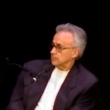I Heard There Was a Secret Chord: Music as Medicine
(Libby/OverDrive eAudiobook)
Available Platforms
Description
More Details
Similar Titles From NoveList
Similar Authors From NoveList
Published Reviews
Publisher's Weekly Review
Playing and listening to music soothes the agitated mind, stimulates memory, and improves physical coordination, according to this exuberant treatise from neuroscientist Levitin (This Is Your Brain on Music). Drawing on experiments conducted in his lab--the brain produces endogenous opioids when listening to music, his students found--and his experience as a professional guitarist and producer, Levitin delves into the burgeoning field of music therapy. Music, he writes, promotes the mind's default mode network of high neural connectivity and stimulates facets of brain function from motor control and memory to focus and emotional control. As a result, research suggests, music may diminish anxiety and depression, reduce blood pressure, improve walking and speech in Huntington's disease patients, lessen Alzheimer's symptoms, and even help to bridge seemingly uncrossable social divides (at a 2009 Esalen Institute workshop Levitin attended, Israeli and Palestinian participants wrote a song together that called for the removal of walls between the West Bank and Israel, swaying some Israeli hardliners that the wall was antithetical to peace). Enriching lucidly explained neuroscience with ebullient musical appreciation (a Billy Pierce saxophone solo is "in turns thrilling, heartbreaking, bustling, radiant, and always, always moving forward"), Levitin makes a persuasive case for music's therapeutic potential that gives due to its medical promise without undercutting its mysteries. The result is a fascinating take on the tuneful raptures of the mind. (Aug.)
Kirkus Book Review
A leading researcher delves into the unique healing powers of music. Most people have certain pieces of music that improve their mood or make them tap their foot. Levitin, a respected neuroscientist and cognitive psychologist with a long list of academic and artistic qualifications, has been studying this phenomenon for years, using MRI and other advanced technologies to find out what is going on inside the brain. He delved into this area in his books This Is Your Brain on Music and The World in Six Songs, and this book extends and updates his research. Listening to music activates certain areas of the brain, and the aim is to use that increased stimulation to help areas that have been damaged by illness or are malfunctioning to produce depression or other mental problems. Levitin has had significant success using music as a form of treatment, although he acknowledges that there is still much about neuroanatomy that is unknown. Using it for movement problems has been the area that has shown the most promise, and the chapter on treating Parkinson's disease is illustrative of what can be achieved. There has also been success with treating PTSD, helping sufferers reconnect with their pre-trauma identities. The author emphasizes that there are no magic bullets, and not everyone responds. Moreover, each patient has to find a piece of music--or a genre or style--that speaks to them. Nonetheless, Levitin is convincing in his argument that this area potentially offers an alternative or supplement to pharmacological methods. Informative and enjoyable, this book is for anyone interested in how the practice of medicine is expanding, and it's a must-read for fans of the author's previous books on music and the brain. Levitin's story is a fascinating piece of work, written with authority, empathy, and occasional humor. Copyright (c) Kirkus Reviews, used with permission.
Library Journal Reviews
Neuroscientist Levitin (emeritus, Minerva Univ. and McGill Univ.; Successful Ageing: Getting the Most Out of the Rest of Your Life) is also a musician who has devoted much of his attention to the role of music—classical, folk, popular—in various therapies and how it impacts the human brain. In his latest book, he investigates the neuroanatomy of music and how it relates to memory and attention. He also offers insight into what he calls the brain's default modes: introspection and meditation. His book takes a look—in a brilliantly creative yet solidly evidence-based light—at the part music can play in the treatment of movement disorders. He also explores other health issues that music can help: Parkinson's disease, trauma-induced and other mental illnesses, memory loss, dementia, Alzheimer's, strokes, and other types of pain and neurodevelopment disorders. VERDICT This fascinating and valuable title gives readers insight into the many neurological benefits of music. Most readers can easily identify what kind of music calms them, provokes creative sparks, or helps get them through strenuous exercises but until they read this, they may not know why music has that power or that it can be great medicine too.—Marcia Welsh
Copyright 2024 Library Journal.Publishers Weekly Reviews
Playing and listening to music soothes the agitated mind, stimulates memory, and improves physical coordination, according to this exuberant treatise from neuroscientist Levitin (This Is Your Brain on Music). Drawing on experiments conducted in his lab—the brain produces endogenous opioids when listening to music, his students found—and his experience as a professional guitarist and producer, Levitin delves into the burgeoning field of music therapy. Music, he writes, promotes the mind's default mode network of high neural connectivity and stimulates facets of brain function from motor control and memory to focus and emotional control. As a result, research suggests, music may diminish anxiety and depression, reduce blood pressure, improve walking and speech in Huntington's disease patients, lessen Alzheimer's symptoms, and even help to bridge seemingly uncrossable social divides (at a 2009 Esalen Institute workshop Levitin attended, Israeli and Palestinian participants wrote a song together that called for the removal of walls between the West Bank and Israel, swaying some Israeli hardliners that the wall was antithetical to peace). Enriching lucidly explained neuroscience with ebullient musical appreciation (a Billy Pierce saxophone solo is "in turns thrilling, heartbreaking, bustling, radiant, and always, always moving forward"), Levitin makes a persuasive case for music's therapeutic potential that gives due to its medical promise without undercutting its mysteries. The result is a fascinating take on the tuneful raptures of the mind. (Aug.)
Copyright 2024 Publishers Weekly.Reviews from GoodReads
Citations
Levitin, D. . J. (2024). I Heard There Was a Secret Chord: Music as Medicine (Unabridged). Recorded Books, Inc..
Chicago / Turabian - Author Date Citation, 17th Edition (style guide)Levitin, Daniel J. 2024. I Heard There Was a Secret Chord: Music As Medicine. Recorded Books, Inc.
Chicago / Turabian - Humanities (Notes and Bibliography) Citation, 17th Edition (style guide)Levitin, Daniel J. I Heard There Was a Secret Chord: Music As Medicine Recorded Books, Inc, 2024.
Harvard Citation (style guide)Levitin, D. . J. (2024). I heard there was a secret chord: music as medicine. Unabridged Recorded Books, Inc.
MLA Citation, 9th Edition (style guide)Levitin, Daniel J. I Heard There Was a Secret Chord: Music As Medicine Unabridged, Recorded Books, Inc., 2024.
Copy Details
| Collection | Owned | Available | Number of Holds |
|---|---|---|---|
| Libby | 2 | 0 | 3 |






























